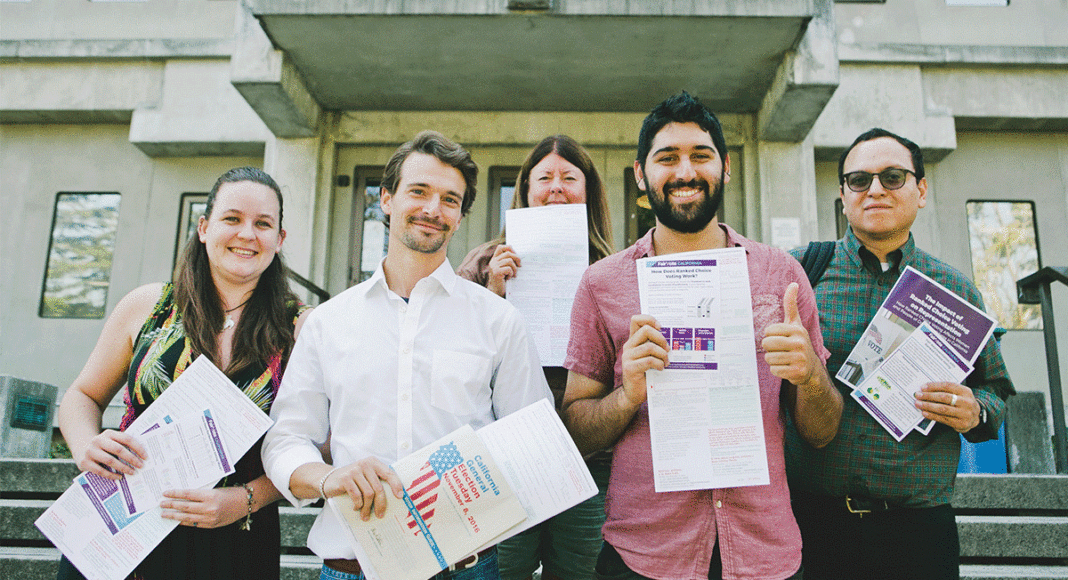In a political world where each party harps on the pet issues near and dear to their platform, topics like election reform remain relatively neutral ground. Perhaps that’s because, as Santa Cruz’s Manu Koenig suggests, both sides have a vested interest in the status quo.
That’s why Koenig and Faisal Fazilat, the locals behind an effort to create “ranked choice voting,” think of reform as a bipartisan issue.
Koenig, a self-described “neo-libertarian,” and Fazilat, a progressive Democrat, say the concept—endorsed by former President Barack Obama, Sen. John McCain and Sen. Bernie Sanders—could revolutionize elections for the better.
“It’s an issue that both sides of the political spectrum can agree on—because, in the end, every side wants fair elections. Everyone wants it to be democratic,” says Fazilat.
Koenig and Fazilat insist that ranked choice would remedy much of what voters complain about in the current state of our democracy: vote-splitting, negative campaigning, tactical voting—i.e., choosing the lesser of two evils. They say it would halt the narrow, unlikely victories by extreme candidates with limited appeal. Ranked choice is already in 11 cities, like San Francisco, and soon coming to the state of Maine, with a movement brewing to expand that. Koenig and Fazilat are shooting to get Ranked Choice Voting on the 2018 ballot for local Santa Cruz County elections.
They will have to win over skeptics, who say ranked choice overcomplicates the ballot system and confuses voting.
With ranked choice, rather than picking one candidate, voters rank the candidates in order of preference. Everyone’s first choice is tallied. If there’s no clear majority winner, the candidate with the least votes is eliminated. In the next round of counting, the choices of voters whose candidate was eliminated are replaced by their second-choice candidates. The process continues until there is a clear majority winner.
“Candidates have to win by broad appeal. Because of that, it discourages mudslinging,” Fazilat says. “Ranked choice voting would encourage candidates to actually talk about the issues that voters care about. This kind of system favors grassroots campaigns where candidates are going door-to-door. They’re talking with as many people as they can.”
Koenig, cofounder of Civinomics, has been involved with the issue since 2015, but his interest increased after Trump’s unlikely victory last November. Originally from Santa Cruz County, Koenig moved back this year, after a year and a half in Las Vegas, to help make ranked choice voting a reality here, he says.
Fazilat, also motivated by the election results, became involved last December, helping to form Yes on Ranked Choice, which Koenig has since joined. They both say that Santa Cruz needs to replace its aging voting equipment soon, and new equipment would be able to quickly scan ranked ballots.
So far, they’ve devoted much of their energy toward talking with the Santa Cruz city councilmembers, who have the power to add this to the 2018 ballot. If that doesn’t work, Yes on Ranked Choice can go directly to the voters, if they collect 3,909 signatures to get it on the ballot themselves.
Coco Raner-Walter, chair of the Santa Cruz County Democratic Party, says some leading local Democrats are excited about the idea, although others have reservations. “The one thing I’m wondering is—is this going to make it more confusing or less confusing for the voter? Until they have a real resolution that’s submitted for ballot, it’s still a work in process,” Raner-Walter says.
Gov. Jerry Brown vetoed a bill to expand ranked choice cities from charter cities, like Santa Cruz, to general law cities, sharing those same concerns about Californians needing elections to be less confusing.
Fazilat says they’ve had high turnouts at their events, and that most voters they talk to react positively to the concept once they become aware of it.
“The opposition is usually like, ‘It’s too confusing.’ That’s just not true. This is not some crazy algorithm. It’s really simple,” Koenig says.
Fazilat notes that Santa Cruz’s recent local elections have been tight, which he feels does not always create fair outcomes in a “winner-take-all system.”
With enough support, he hopes the idea works its way all the way up to the presidential election.
“If most people think about it on a national level, they’re like, ‘if we had this for the presidential election, then we wouldn’t have these issues,’ which is true,” Fazilat says. “But in order for us to really expand to a statewide or federal effort, we need to start here at home.”
Faisal Fazilat and other organizers will hold an event about ranked choice voting at 7 p.m. on Thursday, Aug. 17 at the Santa Cruz Community Church, located at 411 Roxas St., Santa Cruz.














